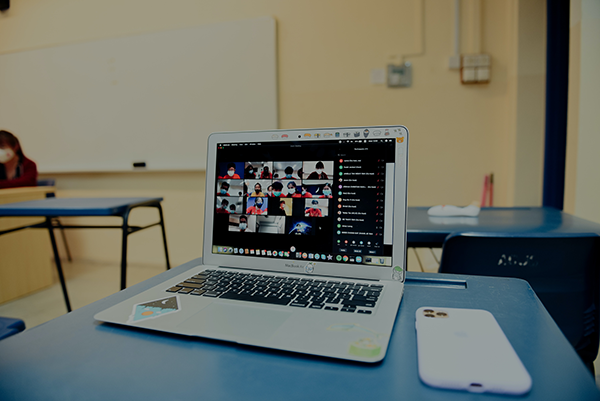Project Results

Result 1: Wellbeing in online education analysis
A survey will be conducted in all partner countries to find the critical issues and positive aspects of distance learning experienced by students, teachers and parents. Each partner will involve in its local context a target group of 90 people (30 for each target group). The survey will be done online and be structured as a mix of closed and open questions. After data collection, we will analyze the data and produce a report, presenting the results in detail. The analysis report will be made available on this page.


Result 2: The WIDE methodological framework
This is a Summary of the WIDE methodological Framework, To down load the full version of the report in English click below.
Abstract
Amidst the turmoil of the COVID-19 lockdown, digital education emerged as a resilient force, empowering students and teachers alike to transcend distance, adapt, and thrive in the face of adversity. Or so it was thought because as the lockdown extended and, as a result, social contact continued to be restricted, the initial perception of e-learning as a thrilling opportunity to revolutionize human capital inputs started to waver. Rather than being a seamless solution, it presented challenges for students and teachers (and parents of pupils as well), resulting in a decline in pedagogy quality, hindered professional development, and disturbances to mental well-being. Within this crucial context, WIDE (Well-Being in Digital Education) project endeavours to provide a holistic and transposable approach to reinforce inclusive and innovative education systems that foster not only insight acquisition but focus on the mental well-being of all the stakeholders involved in the e-learning process.
The present document (WIDE methodological framework ) examines the propaedeutic valuable outcomes that the WIDE project has garnered in the initial pahsese of its implmentation, comprehensively displayed in different sections to facilitate the reader’s understanding.
The first section provides a comprehensive summary of the project’s context, methodology, and outputs. It offers a concise overview that enables a quick and thorough understanding of the project as a whole.
The second and third sections offer a detailed contextualization of the topic and state the project objectives and results. It delves into relevant research studies, data, and the issues that have emerged as a result of the pandemic lockdown which onset in the spring of 2020. Specifically, the shift in perspectives and approaches to digital. From a stimulating and urgent digitization process associated with modernization to a hostile and tiresome environment that proves inefficient and burnout, e-learning was perceived as a tedious and temporary task to go through until face-to-face teaching was reinstated. WIDE project, therefore, aims to display e-education as a fully integrative approach to learning, as valuable as the on-site methodology offers. For this purpose, several results were foreseen in order to accomplish the aforementioned objective.
The fourth section explores the European Union’s stake in the matter, mentioning the challenges that both students and teachers were subjected to, including a sense of isolation, information overload and forced distance learning, that hindered their mental well-being.
The fifth section encompasses the four-day training event held in Modena and its consequent survey results, which proved to extract valuable insights from parents’, students’ and teachers’ experiences during the Covid lockdown. The dimensions of the investigation included comfort, tiredness, effectiveness, motivation, learning, focus, homework, adult help, classmates help and loneliness in digital education. Whereas parents presented more confidence in the new online system, students appreciated their classmates’ collaboration and homework assignments. Teachers supposed that this methodology was more comfortable, yet lone for their students. In addition, extended open comments to the survey questions are displayed for further knowledge. After the training, all stakeholders grasped the following: implement affectionate (human) behaviour and innovative technology and practices.
The sixth and seventh sections of this document refer to the intellectual output of the project: the framework. The philosophical bases of this project entail the deconstruction of the concept of well-being. Well-being does not derive as a result of a linear path but from the multidirectional journey of practising it in companionship. For this purpose, three main phases were devised: Influential Inquiry, the Humans Set Essentials and the Lov-e & Car-e-osity model.
- First, the Influential Inquiry served as ground research to create the relationship between the researchers and the educational actors. The 5-step participatory process includes recognizing the educational needs, accounting for the learning history, ensuring the educational organization’s readiness and the stakeholders’ willingness for the implementation, and co-designing and co-implementing the Learning Strategy.
- Second, the Humans Set Essentials encompass four dimensions: the technical (Toolset), the pedagogical (Skillset), the intellectual (Mindset), and the emotional (Heart-set) competencies. The seamless integration of all four “sets” lead to the optimal learning experience, not only as a learner or student but also as a human being. Regarding its practical implementation, some examples are analysed: an emotional approach to lessons (check-ins and check-outs), techniques to prevent losing the attention of learners (body-related activities), diversified exercises to ensure a good working atmosphere, etc.
- Third, the Lov-e & Car-e-osity model revolves around the humanization of the e-learning process, that is, fostering the relationship between learners and teachers while cherishing the education experience. For that, a 7-step plan was formulated: use stories as a beacon, apply gamification, leverage Behavioral Economics, implement the Gestalt Process Phenomenon, search for the Flow Experience, provide continuous feedback and celebrate the journey.
In the eighth section, all comments and suggestions regarding the practices executed by partners in different countries are recorded.
Finally, the conclusion and reference sections are provided for the reader to delve deeper into the subject matter, gain further insights, and contemplate for future deliberations.
In the journey of digital education, we must remember that ‘Education is not the filling of a pail, but the lighting of a fire.’ – William Butler Yeats. This quote encapsulates the essence of our research, emphasizing the transformative power of education and the importance of igniting curiosity and passion in learners. By embracing digital tools and innovative pedagogies, we can spark a lifelong love for learning and empower individuals to thrive in the digital age.


This result aims at providing strategies and suggestions for the design and development of an inclusive blended and digital learning environment, assuming wellbeing as a fundamental dimension in the design. The guidelines are meant for VET professionals, teachers and trainers, VET managers, involved in the curricula design and development as well as in the learning/training offer’s delivery. The Guidelines will provide suggestions and hints on how to create inclusive learning environments in case of remote learning or blended learning from a pedagogical point of view. Approaches, techniques, and practical tools will be explored and case studies and success stories will be included.


The e-learning course for teachers, trainer, educators is thought as resource able to guarantee upskilling of all professionals involved in the design and implementation of inclusive online/blended learning environments. Partners have conceived this result strictly connected to R2 and R3 to allow all the interested VET professionals, in flexible and focused training opportunities helpful to apply the WIDE methodological framework. Once developed and made freely accessible from the project website in the different partners’ national languages and English, the course will be tested by a pilot group composed by at least 10 teachers/each partner organizations and at least other 50 teachers/trainers/educators out of the partners and associated partners organizations. Therefore, this testing phase foresees to involve about 120 testers. Their feedback will be collected through a questionnaire and interviews in order to improve the course.




